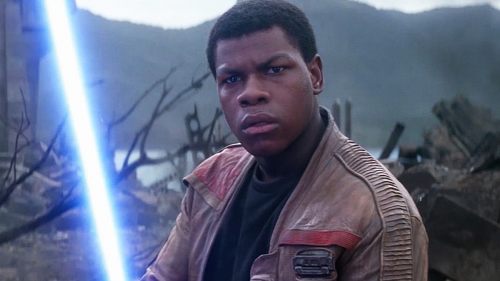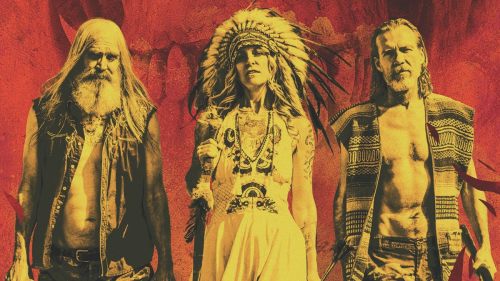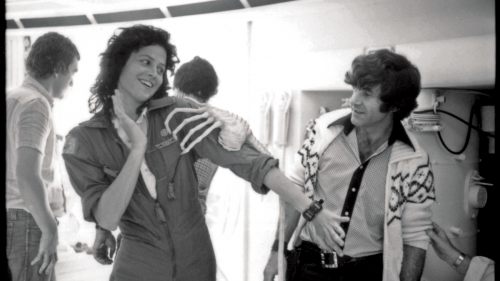Jeremy Saulnier & Macon Blair Discuss The Savagery Of HOLD THE DARK
Hold the Dark is one of the very best films of 2018. Director Jeremy Saulnier and his favorite character actor/writer Macon Blair have delivered a brutal, unclassifiable descent into violence that's incredibly different from their previous collaborations, while still keeping Saulnier's usual brutal fascinations intact. As I said in our Fantastic Fest review of the film:
"Originally pitched to producers as "Snow Country For Old Men", Saulnier and Blair's fourth go-round together (and the first where Blair is the sole credited screenwriter) is an adaptation of William Giraldi’s sparse, opaque wolf-hunting text. Owning a fatalism comparable to famed author Cormac McCarthy's most brutal books, Saulnier and Blair have crafted a motion picture that continuously drives toward ferocity, as if it were the inevitable byproduct of human beings even interacting in the first place. Though it may be thematically tied to his previous pictures, Saulnier is truly flexing his visual muscles here (thanks to a much larger budget), painting a widescreen portrait of infectious evil that’s more grandiose than its rather brilliant predecessors."
I was lucky enough to get to sit down with Saulnier and Blair during the Fest, and what followed was a rather insightful look into how they made this bleak, portentous genre picture for Netflix...
*****
Birth.Movies.Death: I guess the first question is kind of the most obvious one: what was it about William Giraldi's book that spoke to you guys? It's so sparse and punchy, but also sort of vague in its motivations.
Macon Blair: That's sort of it, right? I mean, the way that it's sort of this very mysterious story, and creates this really compelling atmosphere, and sort of gives you permission to not feel like you need everything to be answered or spelled out, which is something that I thought combined well with this very treacherous landscape. Most of all, it just seemed instinctively like something that Jeremy could do a great job with as a director.
So, I read the book and was compelled as a reader, but also thought that if we could get our hands on the rights to it, Jeremy could make a great movie out of it. He read it. He responded as a reader the same way that I did, and we just pursued it passionately. What was funny was how strangely easy getting the rights was. I didn't really know anything about the book's reputation going in, but the process of getting permission to adapt it and actually make the movie was pretty straightforward. We just enthusiastically wrote an email about what we would try and do with the movie and they let us do it, which was really refreshing.
BMD: Which is nice, because the Cormac McCarthy vibe it owns really works well with the sensibilities you guys have already established.
MB: I've overused this line, but it's true: in the pitch document we sent in, we were calling it "Snow Country For Old Men", because that felt like a very mapped sort of comparison; like a weird, fragmented kind of narrative that describes the landscape, atmosphere, and it's sort of nihilistic view on the world. There were a lot of parallels, and if you can reference a familiar book or movie to help orient producers to your movie, all the better.
BMD: It's like his stuff, minus all the insect politics.
MB: [laughs] Exactly.
Jeremy Saulnier: It's not just this chase movie in the wilderness. It's a little left of center from that.
BMD: Now, so many of your movies - from Blue Ruin to Green Room and now Hold the Dark - revolve around tribes of some sort. Blue Ruin has this modern "Hatfields and McCoys" vibe, then Green Room was a standoff movie with these Neo Nazis and punks. Hold the Dark finds literal tribes - between the white people and the indigenous folks - living on the edge of forever.
JS: I'd never actually considered that, now that you bring it up. Sure, the connection is there, but my process is more intuitive than anything else. I gravitate toward conflict, as well as conflict which is not aided by technology. There's isolation in my movies, which explore how people get away from technology and cell phones and sort of "urban convenience". It just sort of ends up being people on the outskirts with old school grudges.
MB: I mean when you say it like that, it feels very obvious. But it actually never occurred to me. I think it's because with each [movie] your blinders are on and you sort of pretend like no other movies have ever been made, especially by you. You know what I mean? You just get so myopic about that project.
JS: [to Macon] But he's got a point: even with Murder Party, it's all about these pockets inside of an artistic community outside of the norm. They band together.
MB: Jesus, yeah. And even the tribal thing was mentioned on the book jacket [of Hold the Dark].
BMD: Got the wheels turning...
JS: It's funny, I consider myself a very visual storyteller, obviously. [laughs] I really love reading the Twitter responses, and seeing the connections people make on their own after one viewing was wonderful. Critics, too. I'm always attracted to those looking into the stuff we do because it's so different from how I view our work.
It's as true as anything else, but I'm not totally aware of it because self-examination is sometimes too much. You don't want to do it, especially with the bone marrow connection that you have with the material. You can overthink it and that will affect everything else you do.
BMD: I wanted to ask you guys about the idea of "savaging" and how that plays into the movie. When Jeffrey Wright's wolf expert uses that term, it almost feels like a key being put into a lock for me. Suddenly, I got where you guys might be going with it.
MB: Like the book, we didn't want to answer a whole lot of questions within the movie - questions about why these crimes are happening - but it was important to pop some little suggestions in there. So, your perception could switch to think there is a curse on these people. Or there could be something else mystical happening. Or there could be something wrong with their bloodline.
I think we have our own ideas about what's really going on, but that's a valid way to see it. If you want to come at it from a more clinical angle, there's a logical way you could address some of these questions. The resources were scarce. There's unnatural stresses and it changes behavior, which becomes observable. Essentially, we wanted to put in guide posts, but we're not going to sit there and tell you "this is what's happening here."
JS: I think it was important to offer up the fact that [Jeffrey Wright's character] Russell Core's most valuable contribution was his observational skills. He's an atypical protagonist in that sense. But it's also what denies any type of typical resolution here, because he's a man searching for understanding in a situation where there might not be any clear cut "knowing" of what's happening. It could all just be a bullshit construct based on how anybody sees the world.
MB: If he were some sort of master hunter, or something like that, and that's the skill that he brings as a hero, then it'd be a different movie.
BMD: Probably the most boring version of this movie...
MB: [laughs] Maybe. But the skill that he brings as a hero is that he's an academic, and so what he can offer is some sort of literate answer, or write a report after it's all over. That's what he can offer this chase film across the Alaskan wilderness. But like you just said, it's really important to touch upon the fact that human behavior is animal behavior, yet people have trouble viewing themselves as "animals" at a very base level.
BMD: So, this is a much bigger movie than your last two collaborations together. What were the challenges when approaching a project of this size and scope?
JS: I was able to "upscale" every element of the filmmaking process due to the budget. Now, if I'm doing aerials, war sequences, whatever it might be, you have to apply that idea to the material itself, and here we had something really beautiful and complex. It's rare to get to upscale so exponentially from one movie to another, but then you also have a more artful, complex narrative, too, so you really have to see where you apply that sense of "bigness" to the narrative. Usually when we get a lot more toys to play with, and a bigger budget, you're asked to conform to a certain formula and deliver a very specific product. Here, we weren't asked to do that...but instead just focused on how to make each element of [Hold the Dark] better.
BMD: And that was going to be my next question: I talked to Gareth Evans recently about working for Netflix, and wanted to ask you a similar question about how the company's somewhat empowering filmmakers with these unique visions by giving them a whole bunch of money to execute their movies. Do you feel like Netflix has really empowered you?
JS: They can be a lot more bold. They're not risk-averse in the same ways that other studios are and, you know, the underbelly of this industry is the simple fact that a lot of films just don't get made because they don't check all the boxes. A lot of people, even myself, forget that as both a filmmaker and an audience member. I'm bored by most stuff nowadays, but Netflix can offer up unique pieces of content because they're not governed by the same rules others are governed by. They just need to deliver material that excites their viewership and gives them the motivation to want to come back and watch more. It's not to guarantee a certain dollar profit upfront, presale to other territories and hedge their bets. They can take a huge risk.
What's also exciting is that people might have a chance to watch these movies on a bigger screen, as everyone wants, because Netflix is listening to people as they evolve. But the main thing for the filmmaker is that they provide a bubble. There's a sphere in which you're protected, and you get to focus on the narrative in front of you. You get to tell the story you want to tell and not be burdened by specific financial constraints. Not only is it freeing creatively, but it also makes shooting even better on set. I remember visiting Macon when he directed [Netflix's I Don't Feel At Home In This World Anymore] and he was just way more relaxed and able to focus on craft.
BMD: Can you talk a little bit about your approach to violence? You almost come off as the modern Peckinpah a bit with how much you're attracted to these visceral, tactile moments.
JS: I am compelled by high stakes situations and I think that means peril. Peril often is coupled with violence. So, to me the violence itself is actually secondary. But as an audience member, I want to transport people back to the times when I would watch a movie and just have a visceral reaction to what I was seeing onscreen. I remember seeing Unforgiven for the first time, and when [Clint Eastwood's] Bill Munney enters that bar for the first time, the hairs on the back of my neck stood up. I want for people to feel that.
So, it's these moments that I'm attracted to, like "holy shit" moments. It's about character and establishing actual humans. When you put them in peril, the audience feels every impact, every bullet that goes through a body or through a car, every sort of flesh wound hurts and it's just about, you know, getting the audience to invest their feelings in this completely contrived narrative world, and hurting the way the characters do onscreen, because they're right there with them.
Hold the Dark is available now on Netflix.



